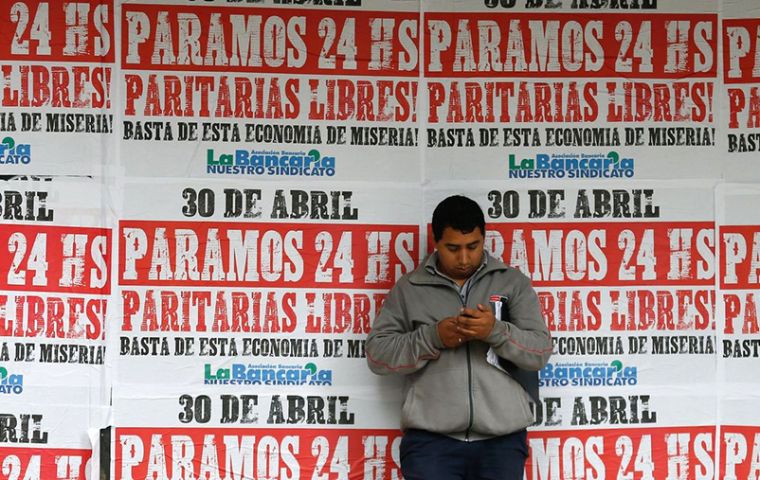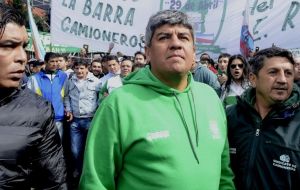MercoPress. South Atlantic News Agency
Major strike and march announced for this Tuesday in Argentina, but unions remain divided
 The strike comes less than two weeks after the government froze prices on basic goods and services, pre-election measures aimed at winning frustrated voters
The strike comes less than two weeks after the government froze prices on basic goods and services, pre-election measures aimed at winning frustrated voters  “Tuesday's strike will be one of the largest in the last few years because people are really tired,” said Pablo Moyano, one of the leaders of the truckers' union
“Tuesday's strike will be one of the largest in the last few years because people are really tired,” said Pablo Moyano, one of the leaders of the truckers' union A national strike will halt much of shale-rich Argentina's economy on Tuesday amid growing investor concern that market-oriented president Mauricio Macri will lose a bid for re-election in October, swinging Argentina back toward state intervention.
“Tuesday's strike will be one of the largest in the last few years because people are really tired,” said Pablo Moyano, one of the leaders of the truckers' union that has called the strike to protest against the president's economic policies.
The strike comes less than two weeks after the government started freezing prices on basic goods and services, pre-election measures aimed at winning over frustrated voters.
The price freezes were accompanied by a sell-off in Argentine stocks and a depreciation of the peso, reflecting concern that Macri's government will not be able to dig itself out of a current recession.
Former populist president Cristina Fernandez de Kirchner published a surprise memoir last week that was largely seen as confirmation that she will run against Macri.
Despite lingering corruption cases against Cristina Fernandez, polls are showing it could be a tight race between her and Macri, but a viable third option could yet emerge.
Although Macri's administration had vowed that inflation would begin to decelerate this year, it rose 11.8% in the first three months ending in March, totaling 54.7% on the year, meaning wages across the board have lost purchasing power.
Divisions among unions means the one-day strike on Tuesday wiill not paralyze the country. Many train and bus lines will continue to operate, but much of the country's ports and airports will be closed as unions hold what is expected to be a massive march in downtown Buenos Aires.
Adherence to the strike by oil workers around the country is expected to be disparate with some unions in southern Santa Cruz, Tierra del Fuego and Chubut province pledging to take part. Oil and natural gas production should not be affected.
Oil workers in Neuquen province, where the Vaca Muerta shale formation is located, are threatening a large strike of their own amid wage negotiations.
The strikes serve as a reminder of the persistent above-ground risks for energy companies that are seeking to gain a foothold in Vaca Muerta, which has helped push up Argentina's oil and gas production in one of the few bright spots for the economy.
Argentina's gas production increased by 5% last year to 128.8mn m3/d (4.5bn cf/d) while crude output rose by 2% to 489,000 b/d, according to data from the country's energy secretariat.




Top Comments
Disclaimer & comment rulesCommenting for this story is now closed.
If you have a Facebook account, become a fan and comment on our Facebook Page!